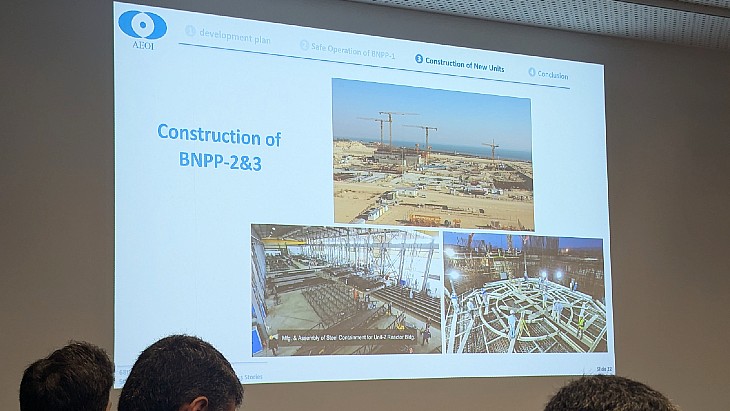Operations begin at US chloride salt test system
.jpg)
The IET is a multi-loop test facility that builds off a series of smaller testing campaigns to inform its design. The non-nuclear system is heated by an external power source. Data from operation of the test will be used to help validate the thermal hydraulics and safety analysis codes needed to demonstrate molten salt reactor systems.
The project was initiated by Southern and TerraPower under the US Department of Energy Advanced Reactor Concepts (ARC-15) award, a multi-year effort to promote the design, construction and operation of Generation-IV nuclear reactors. The project team also includes Core Power, the Electric Power Research Institute, Idaho National Laboratory (INL), Oak Ridge National Laboratory and Vanderbilt University. The programme represents a USD76 million total project investment with a 60%-40% public-private cost share.
Construction and installation of the IET facility was completed in October last year. Since then, the project team has completed mechanical, electrical and controls verification and commissioned all systems. Commissioning employed hot argon and chloride salts to confirm readiness, including filling and flushing of drain tanks and verifying operation of freeze valves - a unique and important component for salt systems.
Chloride salt has now been loaded into the primary coolant salt loops and pumped-salt operations have begun. A multi-month test campaign will provide valuable salt operations data and know-how for the Molten Chloride Fast Reactor programme.
"The Molten Chloride Fast Reactor has the potential to meet the carbon-free needs of hard-to-decarbonise industrial sectors including and beyond electricity," said Jeff Latkowski, TerraPower senior vice president for the Molten Chloride Fast Reactor. "The Integrated Effects Test will help us gather and evaluate data to support the development of our technology, and we are excited to launch pumped-salt operations."
The IET also supports the development and operation of the Molten Chloride Reactor Experiment at INL, a proof-of-concept critical fast-spectrum salt reactor. At less than 200 kW, the reactor will provide experimental and operational data.
Both the IET and the Molten Chloride Reactor Experiment will inform the design, licensing and operation of an approximately 180 MW Molten Chloride Fast Reactor demonstration planned for the early 2030s time frame.
"Southern Company believes the next generation of nuclear power holds promise in providing an affordable and sustainable net-zero future that includes reliable, resilient and dispatchable clean energy for customers,” said Mark Berry, Southern Company Services senior vice president of research and development. "It's exciting to see each new landmark in the Integrated Effects Test, as it helps our nation rebuild lost molten salt reactor knowledge."
"The start-up of the Integrated Effects Test is a milestone achievement in the development of the first fast-spectrum molten salt reactor, and we are immensely proud to contribute to its success," said Core Power President and CEO Mikal Bøe. "The Integrated Effects Test allows us to collect that crucial last-mile data for a design and build of the Molten Chloride Fast Reactor and takes the team one step closer to a genuinely unique way to do new nuclear that is appropriate for the commercial marine environment."
TerraPower's MCFR technology uses molten chloride salt as both reactor coolant and fuel, allowing for so-called fast spectrum operation which the company says makes the fission reaction more efficient. It operates at higher temperatures than conventional reactors, generating electricity more efficiently, and also offers potential for process heat applications and thermal storage. An iteration of the MCFR - known as the m-MSR - intended for marine use is being developed.
TerraPower is also developing Natrium technology - featuring a sodium fast reactor combined with a molten salt energy storage system - a demonstration plant for which is to be built at Kemmerer in Wyoming.
_92619.jpg)

_84504.jpg)







_88592.jpg)

